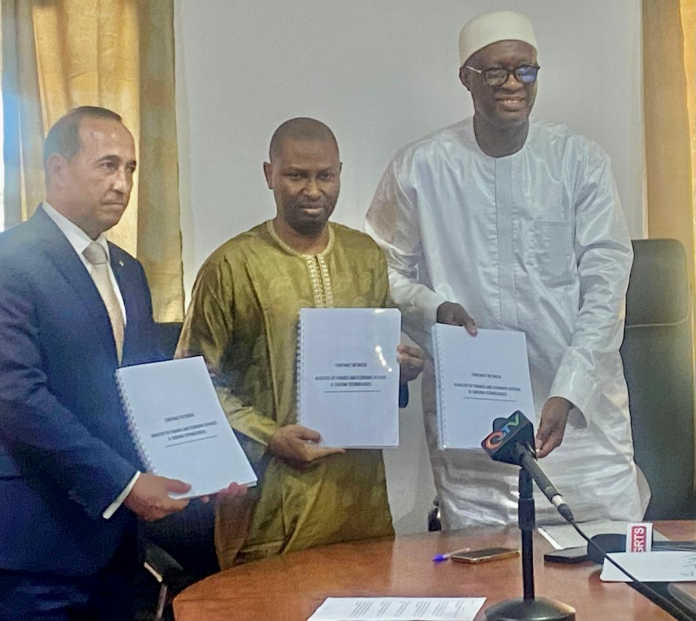By Mustapha Jallow
The Gambia Revenue Authority (GRA) has recently signed a Memorandum of Understanding (MoU) with Sogema Technologies, a Canadian-based company operating in over 26 countries, to boost efficiency and transparency in revenue collection.
Canada’s Sogema and Smart Business Group have been awarded contract for the provision, implementation and support of the Standardised Integrated Tax Administration System (SIGTAS).
The project, supported by the World Bank, aims to modernise the country’s revenue administration system.
GRA Commissioner General Yankuba Darboe said the MoU is the outcome of years of planning and hard work.
“The new system, which will be web-based, will bring a significant shift in how we collect taxes, introducing functionalities like e-registration, e-filing, and e-payments,” he says.
He explained that once the new system is launched, the taxpayers will be able to file and pay their taxes from the comfort of their homes or offices without the need to come to the GRA.
“This will inevitably reduce the cost of compliance for our taxpayers and will introduce a lot of efficiency in our tax administration,” he said.
Commissioner Darboe said the first step in the implementation of the project involved business process re-engineering (BPR), which would allow GRA to examine all its business processes, from registration to filing and payment, refunds, objections and appeals, aimed at identifying gaps and proposing solutions for automating the entire business process.
“This assignment was conducted by Ernst and Young through a competitive bidding process in 2021. After the completion of the business process re-engineering in 2023, we launched an international tender inviting reputable IT firms to submit bids for the design and supply of a custom-made integrated tax administration system. After a comprehensive evaluation process, Sogema Technologies, a Canadian firm, emerged as the most responsive bidder based on their proven track record and expertise in delivering similar tax administration solutions in other countries,” Darboe said.
Darboe explained that the negotiation took several days, adding that the team comprised staff from GRA, Ministries of Finance and Digital Economy, PURA, and the GFMDP project. He said the parties were able to agree on the project implementation plan, start date, availability of key personnel, functional and non-functional requirements, and the project completion date.
He informed the contractor that GRA has high expectations for the project.
“We are entrusting you with a project of immense importance. We expect a robust and efficient system to be delivered on time and within the budget. On our part, we are fully committed to fulfilling our obligations under the contract, and we will collaborate closely with you throughout the entire implementation phase. We expect that you will provide the necessary training and knowledge transfer to our staff to handle technical issues that may arise post-implementation.” Darboe stated.
He said the project is a significant development for the country’s economy.
“The ITAS will mark the completion of the digitization of our two revenue collection systems following the launch of the Asycuda World system in 2022, bringing about a wave of efficiency gains that will benefit both taxpayers and the government,” he added.
Hani Michel, the Chief Growth Officer of Sogema Technologies said the implementation of the new solution will allow the government to increase its capacity to collect taxes and drive government revenues in a transparent and accountable manner.
“In line with Sogema Technologies’ mission, it is expected that the implementation of the latest version of ITAS will contribute to the Gambia’s progress towards modernization and improved overall socio-economic well-being. The ITAS solution, delivered by Sogema Technologies, will introduce new features allowing the GRA to move from a paper-based system to a digital one, which will allow taxpayers to submit their tax returns online,” he said.
Micheal stated that the new processes are expected to support tax compliance and provide the foundation for the government to execute and automate its economic policy while increasing collection rates and raising overall revenues for the country.
“The new system will also seek to optimise decision-making and improve collaboration between the GRA and external entities to help prevent tax evasion.
The tax solution ITAS was first implemented in Asia-Pacific in 2001 through a contract with the government of Timor-Leste. Since then, ITAS has been implemented in 27 countries worldwide.
“The Gambia will now benefit from ITAS with the latest version implementation,” Micheal said.
Abdoulie Jallow, the Permanent Secretary at the Ministry of Finance said many countries around the world have adopted such systems, and they are working fine. He highlighted the significant strides made by the GRA over the years to improve its tax mobilisation drive.
“We have seen record collections in recent months of D2 billion in a single month. That collection fifteen years ago would have been okay with our annual collection, so if we can do that in a month, it means that we have engaged in a lot of digital transformation,” he said.


















